

Social media and professional development: a systematic review. * Abella, V.
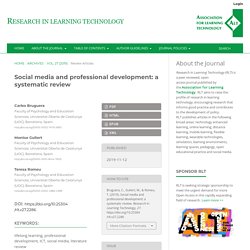
& Delgado, V. (2015) ‘Aprender a usar Twitter y usar Twitter para aprender’, Profesorado, vol. 19, no. 1, pp. 364–378. Available at: Alshiekhly, U., et al., (2015) ‘Facebook as a learning environment for teaching medical emergencies in dental practice’, Education for Health, vol. 28, no. 3, pp. 176–180. Alsobayel, H. (2016) ‘Use of social media for professional development by health care professionals: a cross-sectional web-based survey’, JMIR Medical Education, vol. 2, no. 2, p. e15. Gettin’ a little crafty: Teachers Pay Teachers©, Pinterest© and neo-liberalism in new materialist feminist research: Gender and Education: Vol 29, No 1.
Uses and Gratifications factors for social media use in teaching: Instructors’ perspectives - Anatoliy Gruzd, Caroline Haythornthwaite, Drew Paulin, Sarah Gilbert, Marc Esteve del Valle, 2018. Social Media and Reflective Thinking: A Case Study of Generation. Towards a Social Media Pedagogy KrutkaDG NowellS WhitlockAM JTATE 2017. Recrafting formal education final draft post refereeing. Creating the golden triangle of evidence‐informed education technology with EDUCATE - Cukurova - 2019 - British Journal of Educational Technology. EDUCATE is a London‐based programme that supports the development of research‐informed educational technology (EdTech), allowing entrepreneurs and start‐ups to create their products and services, and simultaneously grow their companies in a more evidence‐informed manner.
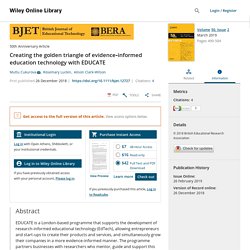
The programme partners businesses with researchers who mentor, guide and support this research journey, a key aspect of which is the evaluation of the company’s EdTech product or service. However, conducting impact evaluations of technology in education is challenging, particularly for early stage technologies, as rapid cycles of innovation and change are part of their essence. Here, we present the pragmatic approach to evidence‐informed education technology design and impact evaluation, as developed and adopted by the EDUCATE programme. The research process is shaped by the core principles of evidence‐informed decision making detailed in the paper. The contributions of the paper are threefold. 57130 ch1. New literacies practices of teenage Twitter users: Learning, Media and Technology: Vol 41, No 1. Data literacies for the postdemographic social media self. Developing social media literacy. Social Media in the Writing Classroom and Beyond - Zheng - - Major Reference Works.
Framing the Issue The rapid technological transformation of day‐to‐day life has necessitated a rethinking of literacy pedagogy.
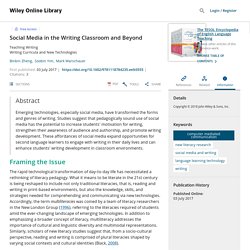
What it means to be literate in the 21st century is being reshaped to include not only traditional literacies, that is, reading and writing in print‐based environments, but also the knowledge, skills, and strategies needed for comprehending and communicating via new technologies. Accordingly, the term multiliteracies was coined by a team of literacy researchers in the New London Group (1996), referring to the literacies required of students amid the ever‐changing landscape of emerging technologies.
In addition to emphasizing a broader concept of literacy, multiliteracy addresses the importance of cultural and linguistic diversity and multimodal representations. The notion of multiliteracies can open up new possibilities for second language teaching, especially in the area of writing. Making the Case. Ethics as Methods: Doing Ethics in the Era of Big Data Research—Introduction - Annette N Markham, Katrin Tiidenberg, Andrew Herman, 2018.
In recent years, we have witnessed several situations that raise new and old questions about ethics.
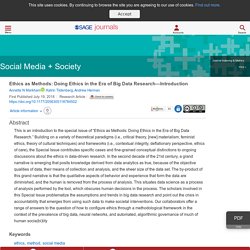
Just as we wrap up this Special Issue, in fact, our news feeds unveil details of the latest case, where Cambridge Analytica, a large data mining and analysis firm, was able to access personal details of 50 million Facebook users without their direct permission or knowledge. This case is just the latest in a long list that illuminate the complications of ethics in social media practices (i.e., wide scale public shaming), data management (i.e., deliberate or accidental releases of private information), data slippage (i.e., moving from one context to another), technology design (i.e., search engine bias), and multiple other areas relevant for (social) life today.
Journal Description: Social Media + Society: SAGE Journals. Indexed in: Google Scholar, DOAJ, Emerging Sources Citation Index (ESCI), ScopusSJR (SCImago Journal Rank) Score: 1.170Launched in 2015A broad selection of published Special Collections Social Media + Society (SM+S) is a peer-reviewed, open access journal that focuses on advancing the understanding of social media and its impact on societies past, present and future.
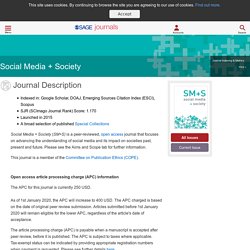
Please see the Aims and Scope tab for further information. This journal is a member of the Committee on Publication Ethics (COPE). Open access article processing charge (APC) information The APC for this journal is currently 250 USD. As of 1st January 2020, the APC will increase to 400 USD. The article processing charge (APC) is payable when a manuscript is accepted after peer review, before it is published. v14 no1 a2.